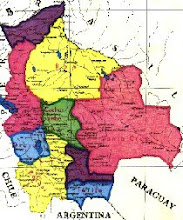Recall vote fails
to excite Cruceños
The possibility of recalling President Evo Morales has produced very little tangible enthusiasm in Santa Cruz, despite the long-time antagonism between the province and the President.
Last week Morales and the opposition-controlled Senate agreed, in effect, to a recall vote in which voters could end the terms of the president and the prefects (or governors) of the nine departments if any of them gets a no vote higher than the percentage by which they won election in 2005.
Morales, for example, would be ousted if the no vote exceeded the 53 percent he received in 2005. The recall referendum has been slated for August 10.
Branko Marinkovic, head of the Committe For Santa Cruz and principal advocate of autonomy for the province, said in a press conference that the recall was basically an annoying distraction that could only create instability and reduce confidence.
It would do nothing, he continued, to deal with the problems of the people, such as the economy, rising prices, and the lack of jobs. "Nothing in Bolivia is functioning now," he said.
Probing at least elite opinion in this currently booming city disclosed that similar sentiments are widely held, and disclosed further reasons there is little enthusiasm for the recall effort against Morales that Podemos, the principal opposition party, has said it will lead.
To start with, no one seems to believe that Morales can actually be recalled. His "core constituency" of Bolivian campesinos has not become disaffected, it is noted, and the Bolivian middle class, which has become disaffected, is not that large outside of Santa Cruz.
Indeed, the conventional wisdom is that the recall referendum will simply succeed in cementing in office the people who are already there, without solving anything. (Santa Cruz´prefect, Ruben Costas, is very popular polls show, and there is almost no chance of his being recalled.
But beyond that many Cruceños who were all for autonomy, do not have that big a problem with Evo Morales´ being president -- as long as he doesn't bother them. And they think the vote for autonomy gives them some protection against that.
The rest of the country really did vote for Morales together with his centralizing and socializing policies, it is said, and they deserve him.
Right now, Santa Cruz wants to be about the business of defining autonomy by electing a governor and legislature, forming a police force, taking charge of schools and health clinics, and, hopefully, showing some positive results. It does not want to be dealing with a constitutional crisis, which recalling the president could cause.
This attitude of benign indifference toward the recall referendum could, however, be changed as the major crisis de jour plays itself out. Santa Cruz' crucial vegetable oil industry held a summit today to decide basically whether autonomy means being able to ignore the national government's ban on the exportation of their product.
Morales and his government has claimed the ban, passed by decree, is an effort to hold down the domestic cost of vegetable oil. People in Santa Cruz, however, believe that it was an attempt to cripple the region's economy. Vegetable oil, mostly from soy and sunflower seeds, is a big business here, employing an estimated 300,000 people.The producers point out that only a small part of production is for consumption in Bolivia, and that the price of vegetable oil in Bolivia is lower than in any other country in South America that does not subsidize it. (Venezuela subsidizes vegetable oil, and the product is cheaper there.) A liter of vegetable oil in Bolivia today costs about $1.90 a liter,roughly equal to a quart.
A decision to defy the export ban could trigger a critical confrontation, though the build-up could take some time. Planting time for next year's soy and sunflower crops is still weeks away.
* * *
All the stakeholders in the vegetable oil situation -- farmers, refiners, workers, etc. -- met and formed a council pledged to restore the right to export by any means possible. A spokesman for the Morales affirmed that only the national government can may export policy.
Thus the stage is set, though meanwhile one association urged farmers to switch to sorghum, wheat, and corn, which are not subject to the new export restrictions.
This weblog was created to provide a fuller and more accurate picture of the current situation in Bolivia. Our principal effort to try to pull things together and place them in proper perspective is the penultimate post below, titled "Main Story."
Wednesday, May 14, 2008
Subscribe to:
Post Comments (Atom)


No comments:
Post a Comment